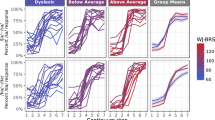Abstract
Children with hyperlexia who learn to read spontaneously before the age of five are impaired in reading and listening comprehension but have been found to have word recognition skills well above their measured cognitive and linguistic abilities. Even though many reports have been published about these children, to date, only one study has investigated whether children with hyperlexia also have strong phonemic awareness skill. In the present study, several phonemic awareness measures were administered to two children with hyperlexia and one child with above average word identification skills who started to read words at a very early age. The results show that all three childrens' levels of phonemic awareness were low and not commensurate with their word reading skill. Wide inter- and intra-individual variations were found on all of the phonemic awareness measures. These findings pose a number of questions for researchers investigating the condition of hyperlexia.
Similar content being viewed by others
References
Aaron, P. G. (1989).Dyslexia and hyperlexia: Diagnosis and management of developmental reading disabilities. Boston, MA: Kluwer Academic Publishers.
Aaron, P. G. (1991). Can reading disabilities be diagnosed without using intelligence tests?Journal of Learning Disabilities 24: 178–191.
Aaron, P. G. & Baker, C. (1991).Reading disabilities in college and high school: Diagnosis and management. Parkton, MD: York Press.
Aaron, P. G., Frantz, S. & Manges, A. (1990). Dissociation between comprehension and pronunciation in dyslexic and hyperlexic children,Reading and Writing: An Interdisciplinary Journal 2: 243–264.
Adams, M. (1990).Beginning to read: Thinking and learning about print. Cambridge, MA: MIT Press.
Aram, D. & Healy, J. (1987). Hyperlexia: A review of extraordinary word recognition. In L. K. Obler & D. Fein (eds.),The exceptional brain (pp. 70–102). New York: Guilford Press.
Bradley, L. & Bryant, P. (1983). Categorizing sounds and learning to read: A causal connection,Nature 30: 419–421.
Brady, S. & Shankweiler, D. (1991).Phonological processes in literacy. Hillsdale, NJ: Erlbaum.
Cunningham, A. & Stanovich, K. (1990). Assessing print exposure and orthographic processing skill in children: A quick measure of reading experience,Journal of Educational Psychology 82: 733–740.
Cunningham, A. & Stanovich, K. (1993). Children's literacy environments and early word recognition skills,Reading and Writing: An Interdisciplinary Journal 5: 193–204.
Dunn, L. & Dunn L. (1981).Peabody picture vocabulary test-revised. Circle Pines, MN: American Guidance.
Goldberg, T. & Rothermel, R. (1984). Hyperlexic children reading,Brain 107: 759–785.
Hammill, D. & Larsen, S. (1986).Test of written spelling-2 (TWS-2). Austin, TX: Pro-Ed.
Hammill, D. & Newcomer, P. (1988).Test of language development-intermediate (2) (TOLD-I). Austin, TX: Pro-Ed.
Healy, J. (1982). The enigma of hyperlexia,Reading Research Quarterly 17: 319–338.
Healy, J., Aram, D., Horwitz, S. & Kessler, J. (1982). A study of hyperlexia,Brain and Language 17: 1–23.
Lindamood, C. & Lindamood, P. (1979).Lindamood auditory conceptualization test. Allen Park, TX: DLM Teaching Resources.
Lundberg, I. (1987). Phonological awareness facilitates reading and spelling acquisition. In W. Ellis (ed.),Intimacy with language (pp. 56–63). Baltimore, MD: Orton Dyslexia Society.
Mann, V. (1984). Reading skill and language skill,Developmental Review 4: 1–15.
Olson, R., Wise, B., Conners, F., Rack, J. & Fulker, D. (1989). Specific deficits in component reading and language skills: Genetic and environmental influences,Journal of Learning Disabilities 22: 339–348.
Perfetti, C. (1985).Reading ability. New York: Oxford Univ. Press.
Semel, E., Wiig, E. & Secord, W. (1987).Clinical evaluation of language fundamentals-revised (CELF-R). San Antonio, TX: Psychological Corp.
Silberberg, N. & Silberberg, M. (1967). Hyperlexia: Specific word recognition skills in young children,Exceptional Children 34: 41–42.
Stanovich, K. (1988). The right and wrong places to look for the cognitive locus of reading disability,Annals of Dyslexia 38: 154–177.
Stanovich, K. (1991). Word recognition: Changing perspectives. In R. Barr, M. L. Kamil, P. Mosenthal & P. D. Pearson (eds.),Handbook of reading research, Vol 2 (pp. 418–452). New York: Longman.
Stanovich, K., Cunningham, A. & Cramer, B. (1984). Assessing phonological awareness in kindergarten children: Issues of task comparability,Journal of Experimental Child Psychology 38: 175–190.
Stanovich, K., Cunningham, A. & Feeman, D. (1984). Intelligence, cognitive skills, and early reading progress,Reading Research Quarterly 19: 278–303.
Stanovich, K. & West, R. (1989). Exposure to print and orthographic processing,Reading Research Quarterly 24: 402–433.
Wagner, R. & Torgesen, J. (1987). The nature of phonological processing and its causal role in the acquisition of reading skills,Psychological Bulletin 101: 192–212.
Wechsler, D. (1981).Wechsler intelligence scale for children-revised. San Antonio, TX: Psychological Corp.
Wiederholt, J. L. & Bryant, B. (1986).Gray oral reading test-revised. Austin, TX: Pro-Ed.
Woodcock, R. (1987).Woodcock reading mastery test-revised. Circle Pines, MN: American Guidance.
Woodcock, R. & Johnson, M. B. (1978).Woodcock-Johnson psychoeducational battery: Test of cognitive ability. Allen Park, TX: DLM Teaching Resources.
Woodcock, R. & Johnson, M. B. (1989).Woodcock-Johnson-revised: Tests of achievement. Allen Park, TX: DLM Teaching Resources.
Zifcak, M. (1981). Phonological awareness and reading acquisition,Contemporary Educational Psychology 6: 117–126.
Author information
Authors and Affiliations
Rights and permissions
About this article
Cite this article
Sparks, R.L. Phonemic awareness in hyperlexic children. Read Writ 7, 217–235 (1995). https://doi.org/10.1007/BF01027186
Issue Date:
DOI: https://doi.org/10.1007/BF01027186




